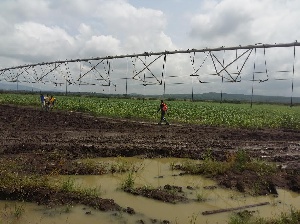 A centre pivot irrigation system at VegPro Ghana Ltd in the Tongu District of the Volta Region.
A centre pivot irrigation system at VegPro Ghana Ltd in the Tongu District of the Volta Region.
By Daniel Kondor
Climate change, slow adoption rate of improved technologies, lack of access to credit, and inappropriate policies among other factors, are affecting subsistence farming in ways that create food supply deficits in many developing countries. Governments spend huge sums of hard-earned revenue importing food, especially rice and meat products as a measure to prevent possible famine.
Last year for instance, the country imported 620,000 tonnes of rice at US$282m to supplement what it produced to meet the demand of its growing population, according to the Ministry of Food and Agriculture.
Successive governments have, since the early 1960’s, made efforts at commercial farming, especially in the north of the country which boasts of large tracks of arable land, but has a difficult climate typical of the guinea savanna, with one rainy season. Rice was identified as the commodity that suits large areas of the place, and for which there was a growing demand in the south as urban populations and incomes rose.
Under the Convention People’s Party government, rice was produced on state-managed, mechanised co-operative farms organised by the United Ghana Farmers’ Co-operative Council (UGFCC). When the regime was overthrown in 1966, the scheme had had only two years of operation in the north. Rice growers had a guaranteed market, but it did not change the peasant farmers’ lives for the better. Andrew Shepherd, a British sociologist in a 1988 paper, stated there was little reason to believe that the UGFCC’s “prospects of success were great.”
In the late 1960’s a substantial investment programme was drawn up to open up the shallow river valleys of the Northern Region for commercial, mechanised farming with the belief that it held the promise of meeting targets set for self-sufficiency in rice production. Initially, rice farmers had been mainly residents of larger towns in the region. Then in the early 1970’s outsiders, mainly civil servants and army officers, joined the system.
In time, rice production in the region increased in acreage from 36,000 in 1970-71 to 140,000 in 1975-76. This was considered as highly commendable. According to Shepherd, a state of national self-sufficiency in rice production was declared, albeit prematurely, after a bumper harvest in 1974-75.
The Agricultural Development Bank led the investment in rice production from 1968 onwards, lending to farmers. It was followed later by the National Investment Bank and such foreign banks as Barclays and Standard. Commercial farming in the north continued through the late 1980’s when it started declining. Peasant farmers remained where they were, unable most of the time to access credit from the banks.
The GCAP initiative
But the potential to produce rice for domestic consumption and even for export was never lost on anybody in spite of the huge rice imports. The government has the responsibility to ensure food security in the country by promoting large-scale or commercial agricultural enterprises, providing bulk-storage facilities, and ensuring efficient food distribution.
So in 2012, it initiated the Ghana Commercial Agriculture Project (GCAP) under the auspices of the Ministry of Food and Agriculture with a total investment support of US$145m. The project is to improve commercial agriculture in the Accra Plains and the Northern Savanna Ecological Zone, also referred to as the SADA Zone. Of that amount, US$100m is a credit facility from the World Bank’s International Development Association, and the remaining US$45m a USAID grant.
Commercial farming is expected to be upgraded to a level that creates wealth and food security in the country. The objective then is to boost the productivity of both smallholder and nucleus farms in selected areas by providing increased access to reliable water, land, funding, and markets for both agricultural machinery and produce.
GCAP has thus set up a mechanism for matching interested landowning communities with equally interested investors, in a bid to achieve responsible agricultural investments. It has done a study and come out with a land lease concept that is to be fed into a database for land banks in the country. Subsequently, it has published three reports on the concept to ensure easy and secure access to land for commercial farming. GCAP works with the Lands Commission to prepare land titles for lands acquired by investors under the project.